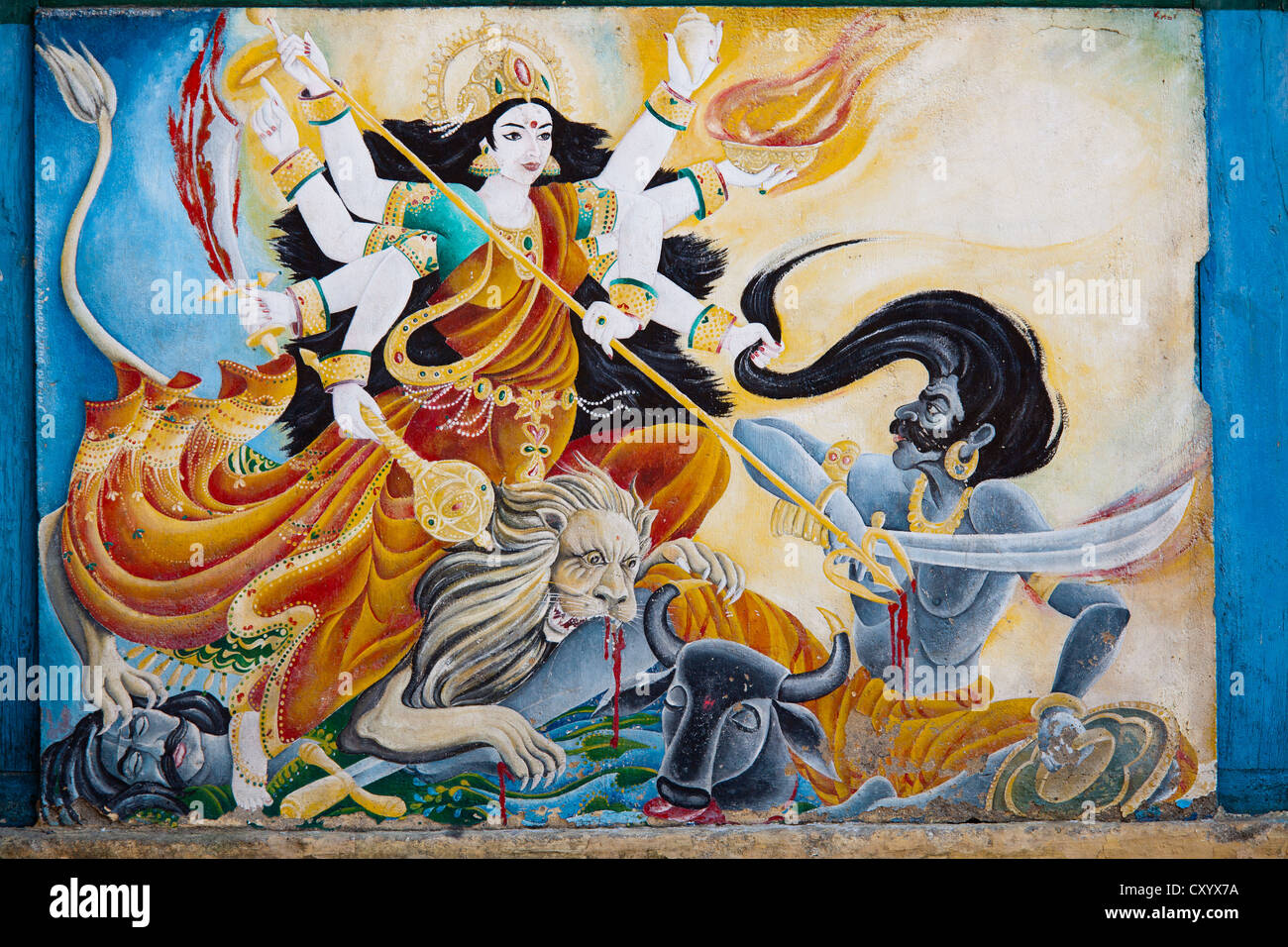
The fight between Devī and Mahishasura was described in Durga Saptashati, Devi Bhagavatam, Skanda Purana. However, it was not mentioned therein that the battle between them had lasted for 9 days, and thus, our celebrating the Puja for the nine nights (Navarātra) in Dussehra (September-October period) time period, is not linked to this story.
It is mentioned in a different place in Devi Bhagavata Purana. This celebration was started by King Sudarśana, a ruler of Ayodhya.
—-
Story of Sudarśana , a devotee of Devī was mentioned in Chapters 14 to 24 of 3rd Skanda in Devi Bhagavata Purana.
Dhruvasandhi was the king of Kosala. During the reign of this King there was prosperity in Ayodhyā and the people were virtuous. This king had two wives Manoramā and Līlāvatī. A son named Sudarśana was born to Manoramā. After a month the second wife also gave birth to a son named Śatrujit.
The King was much pleased and both sons were brought up alike. As Śatrujit was cleverer than Sudarśana people loved Śatrujit more.
Once Dhruvasandhi went to the forest for hunting and was killed by a lion in the forest. According to the custom Sudarśana became King.
Līlāvatī, the mother of Śatrujit was the daughter of the King of Ujjayinī. Her desire was to make Śatrujit the King. Manoramā. the mother of Sudarśana was the daughter of the King of Kaliṅga.
Hearing about the death of Dhruvasandhi, the kings of Ujjayinī and Kaliṅga arrived at Ayodhyā. The King of Ujjayinī got angry because Sudarśana was made king and began war. The King of Kaliṅga took the side of Sudarśana. A terrible battle was fought in Ayodhyā as to who should be the heir to the throne. In the battle Yudhājit, the King of Ujjayinī, killed Vīrasena, the king of Kaliṅga.
Sudarśana and his mother Manoramā were in a sorry plight. According to the advice of minister Vidulla, Manoramā and Sudarśana fled from the capital. Vidulla and the maid of Manoramā accompanied them. Finally, they reached the hermitage of Bharadvāja who was doing penance there. He gave them protection.
After making Śatrujjit King, Yudhājit began to search for Manoramā and Sudarśana. He got news that they lived in Citrakūṭa. Yudhājit went there with an army. But he could not get them out of the hermitage of Bharadvāja. Manoramā and Sudarśana lived safely in the hermitage.
The prince became eleven years old. By this time Bharadvāja had taught the prince Vedas, Śāśtras, etc. The prince was a devotee of Devī. Devī appeared before him and gave him a bow and a quiver which would never become empty, and an impenetrable armour.
Sudarśana married Śaśikalā the daughter of the King of Kāśī. Niṣāda, the King of Śṛṅgiverapura, was a friend of Dhruvasandhi. He gave Sudarśana a chariot which Sudarśana rode through the forest.
While returning from the marriage, Yudhājit and Śatrujjit, along with other their allies, attacked Sudarśana to kill him and take away the bride Śaśikalā. Sudarśana began to recite silently the excellent one word seed mantra of the King of Desires (Kāmarāja).
When the dreadful war began to grow more and more horrible, the Goddess Bhagavatī suddenly appeared there, mounted on Her lion. Assuming diverse forms, the Goddess Durgā, holding various weapons the auspicious Mother of the Universe, began to fight terribly in the battle field. Śatrujit and the king Yudhājit were killed in that terrible battle.
Then Devī ordered Sudarśana to make Ayodhyā as his capital and govern the country. She also ordered to constantly remember HER and worship Her with great care.
She also told to perform Great Puja for the nine nights (Navarātra), 4 times a year , with the greatest devotion in the month of Caitra, Māgh, Āśvīn, and Āṣāḍha.
(Caitra falls in March-April period, Māgh falls in January-February period, Āśvīn or Aśvayuja falls in September-October period, and Āṣāḍha falls in June-july Period).
——
No comments:
Post a Comment